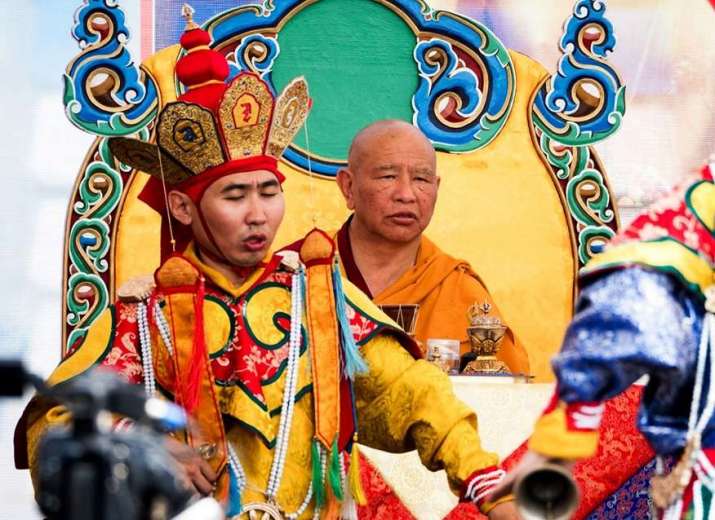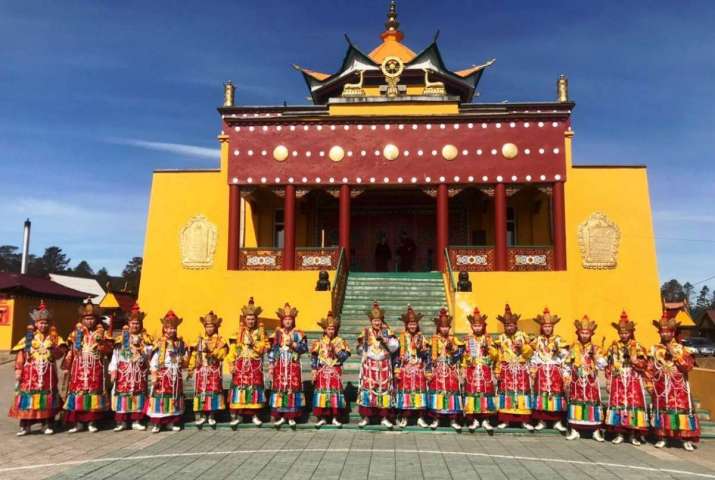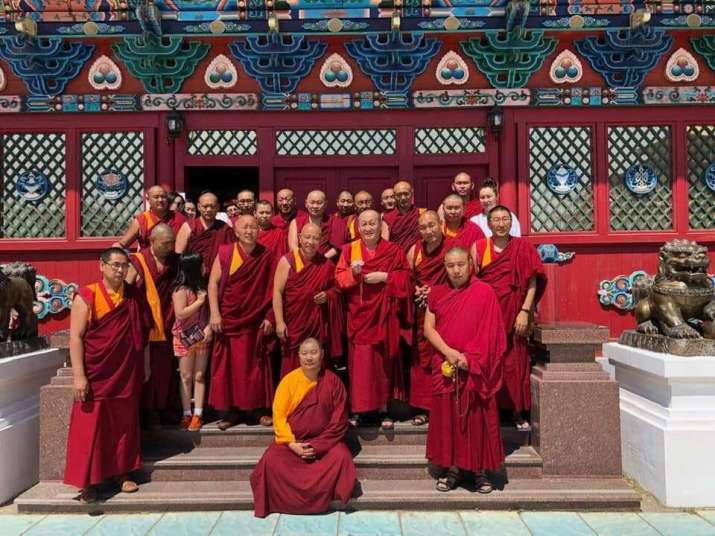NEWS
Jhado Tulku Rinpoche Confers Kalachakra Empowerment in Buryatia
 Jhado Tulku Rinpoche during the cham dance at the Central Stadium of Ulan-Ude. From alexsvatov.livejournal.com
Jhado Tulku Rinpoche during the cham dance at the Central Stadium of Ulan-Ude. From alexsvatov.livejournal.comKhensur Jhado Tulku Rinpoche, a highly esteemed lama in the Gelug tradition of Tibetan Buddhism, will confer the Kalachakra empowerment (Tib: du kyi khorlo wang) in the Buryat capital Ulan-Ude in a program running from 6–19 July.
Jhado Tulku Rinpoche, one of the few recognized modern Kalachakra masters, will give the initiation to Buddhists from the Russian Federation and Mongolia, accompanied by blessings and instructions from His Holiness the Dalai Lama. The program in the Republic of Buryatia has been organized by the Buddhist Traditional Sangha of Russia and Buda Bagshi Tsydenov, abbot of the Kalachakra Temple (Duyinhor Datsan) in Ulan-Ude and head of the Kalachakra Department of D. D. Zayayev Buddhist University Dashi Choinkhorling, with support from the Ministry of Tourism and the Ministry of Sports, and Youth Policy of the Republic of Buryatia. The local authorities have allocated about RUB10 million (US$157,000) to cover the costs of the event, expecting some 40,000 Buddhists to attend this first-ever Kalachakra teaching in the republic.
 Cham performers in front of the Kalachakra Temple in Ulan-Ude. From facebook.com
Cham performers in front of the Kalachakra Temple in Ulan-Ude. From facebook.comThe Kalachakra (Skt. wheel of time) empowerment, is considered one of the most secret, complex, and profound teachings in Vajrayana Buddhism, beneficial not only for Buddhists, but for anyone, regardless of their religious background. There is a tradition of offering this empowerment to large public gatherings, and His Holiness the Dalai Lama has himself given the transmission of the Kalachakra many times around the world for the sake of world peace—most recently in Bodh Gaya, India, in 2017.
Held in the Central Stadium of Ulan-Ude, the program began on 6 July with celebration of the Dalai Lama’s 84th birthday. The first three days consisted of preparations for the construction of a Kalachakra sand mandala, reading the main text of the ritual and performing an offering dance (Tib: cham) to purify the land and seek permission to construct the mandala. The sand mandala will be constructed from 9–14 July, along with a reading of the main text and performing preparatory rituals for receiving the empowerment. The Kalachakra empowerment itself will be held from 15–17 July, along with reading the main text of the ritual, followed by a ceremony for the dissolution of the mandala.
During the final two days of the program, Jhado Tulku Rinpoche will give an oral transmission and extensive commentary on Kalachakra Six Session Guru Yoga. He will also give an oral transmission (Tib: lung) and commentary on Je Tsongkhapa’s The Three Principal Paths to Liberation and Ngulchu Gyalse Thokme Zangpo’s The Thirty-Seven Practices of Bodhisattvas. The teachings are given in Tibetan, with translations into Buryat, English, Mongolian, and Russian.
Cham dance during the Kalachakra teachings in Ulan-Ude. From youtube.com
Before the beginning of Kalachakra teachings, Jhado Tulku Rinpoche was welcomed on 5 July by the spiritual leader of the Russian Federation’s Buddhists and the most senior lama in Buryatia, the 24th Pandito Khambo Lama Damba Badmayevich Ayusheev, at his residence in Ivolginsky Datsan, near Lake Baikal in eastern Siberia. Both lamas performed prayers together with delegations from India and Mongolia.
Jhado Tulku Rinpoche was born in 1954 near the Tibetan capital Lhasa, and at the age of three was recognized and enthroned as the sixth incarnation of the abbot of Jhado Monastery. In 1959, he escape from Tibet to India, where he studied at Sera Je Monastery in southern India and later at Gyoto Tantric Monastery in Dharamsala. In 1991, he attained the highest level of education in the Gelug tradition, geshe lharampa, equivalent to doctorate degree. From 1992–96, Jhado Tulku Rinpoche served as a teacher at Namgyal Monastery in Dharamsala, the personal monastery of His Holiness the Dalai Lama. A year later he became abbot of the monastery, a position he held until 2004. He now travels all over the world to transmit the teachings of the Gelug tradition.
 Pandito Khambo Lama, Jhado Tulku Rinpoche with delegations from India and Mongolia in front of Ivolginsky Datsan. From facebook.com
Pandito Khambo Lama, Jhado Tulku Rinpoche with delegations from India and Mongolia in front of Ivolginsky Datsan. From facebook.comSee more
Калачакра 2019
Власти Бурятии выделят около 10 миллионов рублей на проведение посвящения Калачакры (Сохраним Тибет!)
Secret Teaching of the Buddha Tantra Yidam Kalachakra (Baikal Guide)
Related news from Buddhistdoor Global
Jhado Tulku Rinpoche Visits Moscow, St. Petersburg, Kalmykia, and Tuva
Museum of History of Buryatia Holds 20th Anniversary Exhibition of the Atlas of Tibetan Medicine
Related features from Buddhistdoor Global
Russia’s Golden Triangle of BuddhismBuddhist Holy Sites of the Russian Steppes
Construction of Avalokiteshvara Statue Underway in Buryatia
The Largest Depiction of the Buddha in Russia














